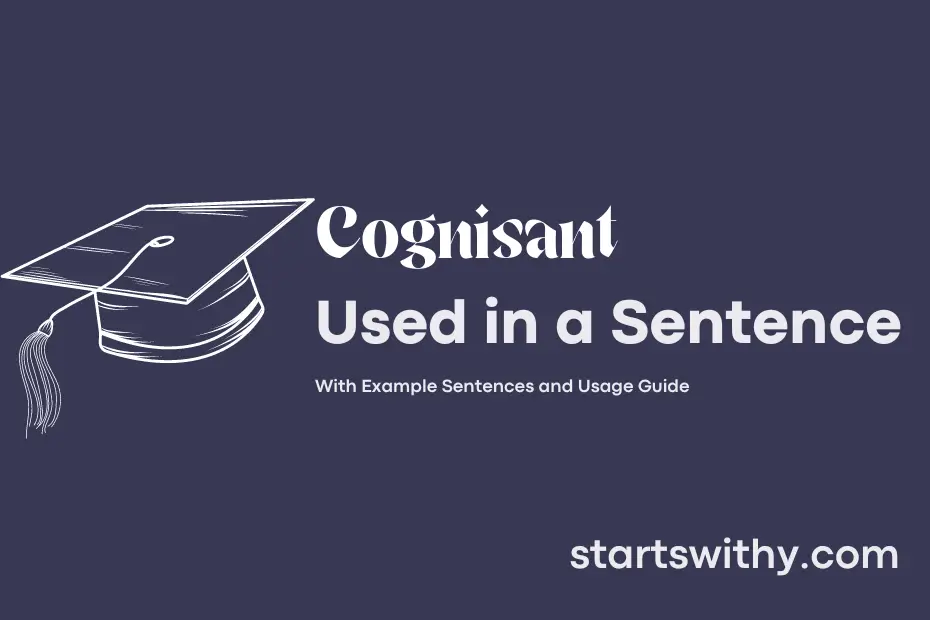Have you ever wondered about the importance of being cognisant in your daily interactions? To be cognisant is to be fully aware or informed about something. It requires a level of attentiveness and mindfulness in any situation.
In conversations or decision-making processes, being cognisant allows individuals to consider various perspectives and make well-informed choices. It involves being conscious of not only your own thoughts and actions but also those of others involved.
7 Examples Of Cognisant Used In a Sentence For Kids
- We should be cognisant of our surroundings when walking on the road.
- It is important to be cognisant of sharing toys with our friends.
- Let’s be cognisant of using gentle words with each other.
- We need to be cognisant of following our teacher’s instructions in class.
- It’s good to be cognisant of our actions and how they may affect others.
- We must be cognisant of keeping our classroom clean and tidy.
- Always be cognisant of being kind to everyone around us.
14 Sentences with Cognisant Examples
- Cognisant of the importance of time management, college students in India often create detailed schedules for their study sessions.
- It’s crucial for college students to be cognisant of the academic resources available to them, such as libraries, online databases, and tutoring services.
- By being cognisant of their dietary choices, college students can maintain a healthy lifestyle while juggling their academic responsibilities.
- College students are increasingly becoming cognisant of mental health issues and seeking out counseling services on campus for support.
- It is essential for college students to be cognisant of plagiarism policies to avoid academic misconduct.
- With the rise in online learning, college students need to be cognisant of cybersecurity measures to protect their personal information.
- Being cognisant of networking opportunities can greatly benefit college students in India as they prepare for their future careers.
- College students must be cognisant of their financial situation and budget wisely to avoid unnecessary debt.
- By staying cognisant of current affairs and global issues, college students can broaden their perspective and enhance their critical thinking skills.
- College students are encouraged to be cognisant of their ecological footprint and adopt sustainable practices in their daily lives.
- It is important for college students to be cognisant of the impact of social media on mental health and practice digital detox when needed.
- College students should be cognisant of the diverse cultural backgrounds of their peers and embrace cross-cultural interactions for a rich college experience.
- By being cognisant of the latest technological advancements, college students can stay ahead in their field of study and future careers.
- College students should be cognisant of the importance of self-care and prioritize their mental and emotional well-being amidst academic pressures.
How To Use Cognisant in Sentences?
Cognisant means being aware or having knowledge of something. To use it correctly in a sentence, follow these steps:
- Identify the main idea or subject you want to express awareness about.
- Insert Cognisant into your sentence to show that awareness.
For example:
– “I am cognisant of the importance of staying hydrated during exercise.”
– “She was cognisant of the potential risks involved in the project.”
– “They remained cognisant of the changing market trends to stay competitive.“
Remember, using cognisant in a sentence adds a level of awareness or knowledge to your statement. Practice using it in different contexts to become more comfortable with incorporating it into your writing or speech.
By following these steps and examples, you can confidently use the word cognisant in your everyday communication to convey your awareness of various topics effectively.
Conclusion
In conclusion, the examples of sentences with “cognisant” demonstrate the correct usage and understanding of the word in different contexts. By using this word, one can express awareness, understanding, or recognition of a particular situation or fact. It is important to be cognisant of the impact our actions have on the environment.
In everyday conversations and writing, incorporating “cognisant” can help convey a deeper level of awareness and mindfulness. Whether discussing personal decisions, social issues, or environmental concerns, being cognisant allows for more thoughtful and informed perspectives. Embracing a cognisant mindset can lead to better decision-making and a more considerate approach to the world around us.



